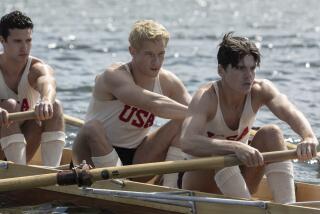Review: In Chicago, a team of Black rowers reunites to inspire community
In the late 1990s on the West Side of Chicago, sirens, gunshots and screams were the soundtrack of the night. For a kid growing up there, nobody asked, “What college are you going to attend?” It was “what gang are you going to join?”
The documentary “A Most Beautiful Thing,” written and directed by Mary Mazzio (“I Am Jane Doe”), shares the unlikely story of a group of young men from those very streets who joined together to form the first all-African American high school rowing team.
When Arshay Cooper, Alvin Ross, Preston Grandberry, Malcolm Hawkins, Ray “Pookie G.” Hawkins and several classmates at Manley High School signed up to row — free pizza was the incentive — they had little idea what awaited them. Ken Alpart, a young white man who had rowed at Penn, recruited the group as a way of introducing the traditionally upper-class sport of crew to inner-city youths and provided training and equipment.
Other coaches joined the cause as the young men, a few of whom had never been on water, sweated in the gym and learned the finer points of rowing — sometimes painfully.
The group formed a tight brotherhood, bonding over the hard work and taking pride in their accomplishments. The activity proved a respite from the dangers in their daily lives, several of them going home to drug-addicted mothers and abusive — or absent — fathers.
The experiment ended after one long racing season in which the Manley crew competed three times — including the Chicago Sprints Regatta — with varying outcomes. At the time, Alpart thought the venture had failed, but the team members remember it differently and fondly.
They credit Alpart with introducing them to more than just a sport. They learned leadership, studied entrepreneurship and discovered the value of their efforts. They saw they had choices. Some would go on to own businesses, and Grandberry earned his barber’s license, but they still faced the challenges of now being adults in a tough neighborhood. They didn’t always make the right choices.
Twenty years later, one of their coaches, Michael O’Gorman, died of a heart attack. O’Gorman may have been insensitive — one of the rowers takes “the 5th” on the subject — but he was respected, and the team gathered for his funeral. Later, documentary crew in tow, Cooper convened them at Grandberry’s shop to ask about getting the band back together.
“I ain’t seen you guys in what, 80 pounds ago?” Cooper jokes as memories flow and the friends agree to get back out on the water. For some, it’s a chance to settle unfinished business, for others, it’s redemption. For all, it’s an opportunity to give back to the community and show their own kids what it’s like to do the unthinkable.
Thicker in the middle and thinner on top, the men settle back into the business of training, even traveling to the Bay Area to work with U.S. Olympic rower and coach Mike Teti, who good-naturedly wonders if they’ll all still fit in the boat.
A builder of bridges, Cooper ups the ante, inviting a group of white Chicago police officers to train with them as they prepare a return to the Chicago Sprints. Not all the Manley alumni are pleased at first, but they soon realize the symbolism as they strive to positively affect the community.
Mazzio, a 1992 Olympic rower herself, nicely captures the beauty of rowing, including the calming sense of peace the water gives team members when they first go out and then experience again two decades later. An evocative hip-hop score, poetic narration by Common and crisp graphics appropriately underline the timeliness of the film.
The documentary, based on Cooper’s self-published memoir (he connected with Mazzio on Twitter after she’d read it), illustrates the differences that can be made through the efforts of a few and draws attention to the high levels of trauma experienced by residents in our poorest neighborhoods. Imagine the systemic changes that can be wrought if the will of the many is used to achieve them.
‘A Most Beautiful Thing’
Not rated
Running time: 1 hour, 35 minutes
Playing: Available July 31 via Xfinity on demand (Comcast subscribers); streaming Sept. 1 on Peacock and Oct. 14 on Amazon
More to Read
Only good movies
Get the Indie Focus newsletter, Mark Olsen's weekly guide to the world of cinema.
You may occasionally receive promotional content from the Los Angeles Times.











